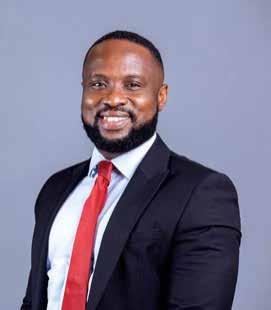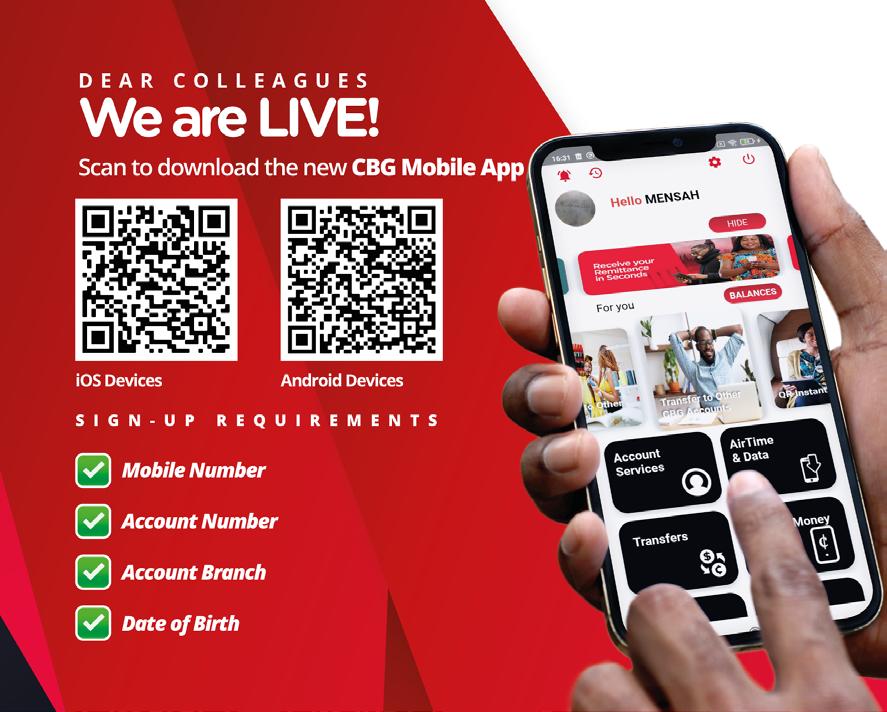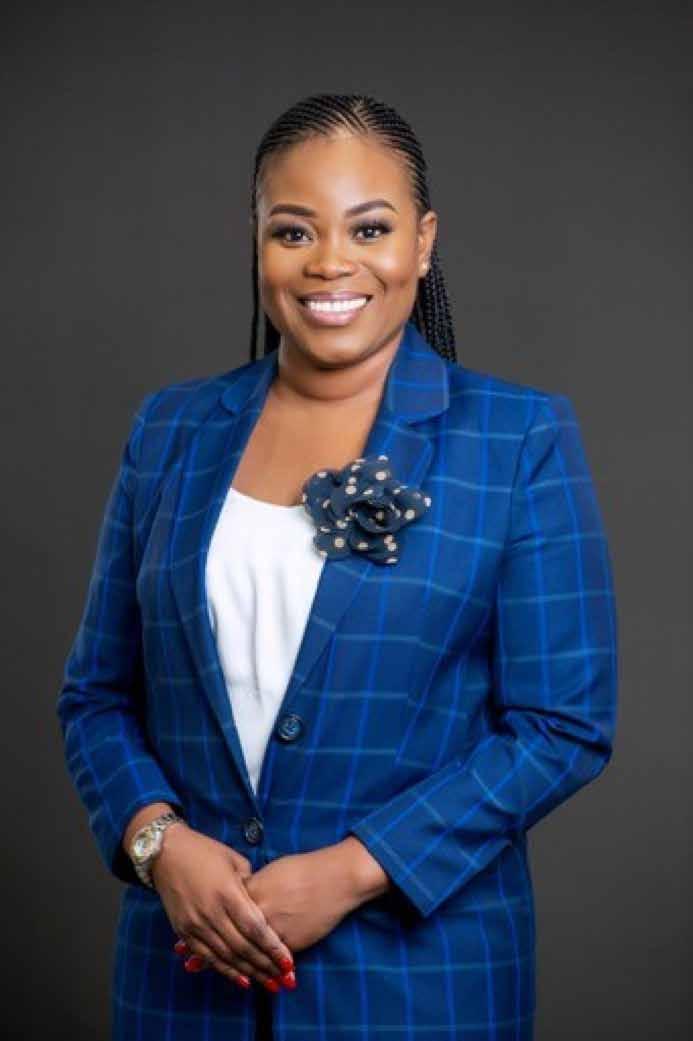










ous improvement,” leaving no stone unturned and has been building upon these improved performances to bolster con dence in the company’s ability to become a

The company hopes to leverage its successes in the last three (3) years regarding operational stability to lay a rm foundation for 2023 and beyond. This is in line with the objectives outlined in its ve (5) year Strategic/Recovery Plan (2020-2024) which places emphasis on maintaining operational stability as it transitions to the “Retro tted VALCO” to assure a sustainable turnaround.
Volta Aluminium Company Limited (VALCO) has recorded positive performance of US$5.7m in 2022 from adjusted earnings before interest, taxes, depreciation and amortization(EBITDA).
The positive position reported for 2022 was attained by the US$8.86m net gains realised from the innovative aluminium forward sale deal the board and management struck with the company’s bankers.
According to thee Chairman of VALCO, Dr Henry Benyah, the positive outcome can also be attributed to price risk management initiative and cost containment/reduction measures as well as the relative operational stability achieved over the last three years.
VALCO recorded US$121.7m in revenue representing growth of 13percent compared to the US$107.5m revenue posted in 2021. Price variance contributed US$19.2m representing 18percent while the shortfall in sales volume impacted negatively by some US$8.5m which represents 5.4percent of total revenue growth in 2021.

In 2022, input prices escalated to record levels, growing the cost of sales by a much higher margin of 24percent to 129.82m. Freight rates also inched up during the period.
Addressing shareholders at the company’s Annual General Meeting (AGM) in Accra, Dr. Benyah also announced that the company is on the market to identify a strategic investor before the turn
of the year.

This follows the approval by the Cabinet of Ghana for VALCO and the Ghana Integrated Aluminium Development Corporation (GIADEC) – the entity holding VALCO’s shares on behalf of the Government of Ghana - to headhunt and engage a Strategic Partner towards the retro t (modernization) of the Smelter to bring to it to world-class standard in terms of technology, operating e ciencies and costs, pro tability, among other bene ts.
He also indicated that transaction advisors have been engaged “to manage the process of the search and selection of a Strategic Partner with the requisite technical capacity to deploy the most competitive smelter technology, backed by the needed investments and strategic global linkages in consideration for an agreed equity stake in a restructured VALCO”.
Reporting on the operational performance of the Company, the Chief Executive O cer, Mr. Dan Acheampong was very pleased to note that VALCO has come a long way from where it faced huge existential challenges, to a relatively stable and productive business, in readiness for the expected massive take o with the sourcing of a strategic investor.
Further, Mr. Acheampong told the meeting that notwithstanding improvements in performance in the last three years, the company was not out of the woods yet. However, team VALCO, he continued, was committed to working in line with its principle of “continu-
The Minister of Public Enterprises, Joseph Cudjoe who was present at the event commended VALCO for improved performance since 2011 and pledged government’s support to revamp the aluminium smelter.
The Company says it has identi ed some product-value maximization and a host of cost reduction initiatives to make the operation sustainable in the short-term while working to implement the nal phase of the Recovery Plan. This is in consonance with the VALCO Modernization Project dubbed Project 4 under GIADEC’s Integrated Aluminium Industry (IAI) Project Masterplan currently under execution.
In the coming year, VALCO emphasizes that it will position itself rmly in the aluminium downstream segment of the Aluminium value chain. This it hopes to do by way of entering into joint ventures (some of which are currently in the developmental stages) or direct participation in the high-end value-addition downstream segment of the Aluminium value chain. The company believes that incorporating downstream activities into its operations like all globally competitive smelters have done, would make its operations more viable.
VALCO also recognizes the fact that the future of aluminum is “green”. It is therefore, positioning itself through various environmentally-friendly initiatives to reduce its carbon footprint in order to take its pride of place as a net carbon emitter and a “Green Aluminium” Smelter.
The appetite for mobile money (MoMo) platform among subscribers has surged following the reduction of the electronic levy (E-levy) from 1.5percent to 1percent, Chief Executive O cer of telecommunication giant MTN, Selorm Adadevoh, has said.
Government introduced the levy on all electronic transactions including on mobile money payments, bank transfers and merchant payments last year to widen the tax net.
Speaking at the 2023 MTN Media and Stakeholder Forum in Accra on Thursday, Mr. Adadevoh said “E-levy reduction has boosted con dence in Momo. We have seen good momentum and are
quite excited about it.
The E-levy has been reduced from 1.50% to 1% of the value of the electronic transfers. This was given e ect to by the passage of the Electronic Transfer Levy (amendment) Act, 2022. Act 1089.
This is in addition to applicable charges. In the case of Person-to-person (P2P) transfer above GHS100, MTN charges will still be at a discounted rate of 0.75% for transfers between wallets on both the MTN Mobile Money Platform (On-net) and through the interoperability (O -net)
P2P transfers of up to GHS100
The country’s cocoa regulator, Ghana Cocoa Board (COCOBOD) has disapproved of statements made by former President John Mahama regarding the cocoa sector, where he is alleged to have stated that the sector has collapsed under the current
administration led by President Nana Akufo-Addo.
In a press statement issued by management, COCOBOD indicated that its attention has been drawn to publications on certain media platforms citing state-
daily on MTN Mobile Money Platform (On-net) are free of charge. A cap of GHS7.5 applies to all transfers above GHS1000 that is initiated on the MTN Mobile Money Platform.
The levy which was introduced in the 2022 budget has not yielded the resources as expected. The introduction of the electronic levy was to help the government mobilise domestic revenue.
The government reduced expectations for revenue collection from the levy after an initial projection of GHS 7bn.
In July 2022, projections were reduced by about ten-fold to GHS 611m. The levy faced sti opposi-
By Eugene Davistion from the Minority in Parliament and was generally unpopular with Ghanaians.
This review is the second for the levy, after initially being pegged at 1.75 percent before the government reduced it in a compromise amid protests against it. The levy was eventually implemented in May 2022.
As mobile money taxes gain popularity across the continent, its design requires very careful consideration, analysts have suggested, with data suggesting that there are currently at least ten African countries that are either considering, or have implemented, a similar tax.
According to the Ghana Revenue Authority (GRA), the E-levy brought 328.80m as of September 2022. The country continues to witness a 20percent improvement in the collection of the levy on a month-month basis.
Data also shows that the new tax measure has performed much more poorly in revenue terms than the government had hoped for. In rst 8 months of the levy’s introduction, it raised only 11% of its revenue target of US $1 billion.
This year’s MTN Media Forum was on the theme ‘leveraging technology to serve customers with excellence. The forum aims at sharing an overview of innovative solutions being churned out by MTN.

ments made by former President John Dramani Mahama, alluding to a collapse of Ghana’s cocoa sector.
The Former President made these statements while touring the Western North Region, claiming
the producer price and mismanagement have collapsed the cocoa sector. Mr Mahama justi ed farmers giving their cocoa farms to illegal mining due to low remuneration.
“Management of COCOBOD

refutes the notion of a collapsing cocoa industry. Such statements are misleading and detrimental to a vital sector like cocoa, which forms the foundation of Ghana's economy. We, therefore, wish to use the opportunity to make some clari cations and also set the records straight.
It is widely acknowledged that Galamsey operations pose a signi cant danger to our nation, and any attempts to justify or rationalise the conversion of a piece of land, especially a cocoa farm, into a Galamsey site, like the Former President sought to do, must be met with contempt.
This menace has the potential to negate all the investments made by the government to modernise cocoa farming and improve productivity. It is, therefore, crucial that prominent gures in
our society exercise caution when making public statements that rationalize cocoa farmers trading their farms for temporary monetary bene t through illegal mining.” the statement captured
Management further maintained that the former president's statement regarding the increase in cocoa producer prices every year during his administration is inaccurate, since the records available point to the opposite. Specifically, there was no upward adjustment of the producer price of cocoa in the 2012/2013 Crop Season. Similarly, the producer price of the preceding season was maintained for the 2015/2016 Crop Season, with no upward adjustment.
“Indeed, within a three-year period of the Former President’s administration, i.e. the 2010/2011 to 2012/2013 crop season, there
was a total of six (6) percent increase in the producer price. In contrast, within the last three years, there has been a 23 percent, 0 percent and a 21 percent increase in the producer price of cocoa.
It is important to note that the producer price is largely determined by international market prices as well as other industry costs, and every e ort is made to arrive at a producer price that is fair to farmers even when international market conditions are unfavourable.
We further wish to put on record and also assure the general public that the cocoa industry is not collapsing as being portrayed by the Former President. Ghana recorded its highest ever cocoa production volume of one million and forty- ve thousand ve hun-
dred metric tonnes (1,045,500) in the 2020/21 Crop Season. A cocoa industry which holds the position as the second highest producer in the world cannot also be said to have collapsed.”
Additionally, the statement captured that COCOBOD continues to invest in interventions which will ensure not just the sustenance but the growth of the industry. Notably, the Hand Pollination Programme that increases pod count; the Mass Pruning Programme to enhance pests and disease control and induce owering as well as the Cocoa Rehabilitation Programme which seeks to deal with the Cocoa Swollen Shoot virus disease that has ravaged about 45% of our cocoa tree stock. This is the biggest intervention that has ever been made to reverse the major threats that face the industry.

Australia Day, marked on January 26 every year, is an occasion to celebrate contemporary Australia and its people, re ect on what it means to be Australian, and acknowledge our history.
It was on January 26, 1788 that the First Fleet of 11 convict ships arrived in Sydney Harbour from England, so beginning the rst permanent settlement of Europeans on Australian soil.
The Commonwealth of Australia itself came into being on January 1, 1901.
But that is just the most recent part of our story – because prior to European settlement, Australia was settled by indigenous Australians for many millennia – according to some scholars for as long as
70 per cent of the world’s species.
We are also home to almost 10 per cent of the world's biodiversity, from tropical rainforest in the north, to the red deserts of the centre, and the snow elds of the south-east.
Modern Australia is a thriving nation, a G20 member with the 12th largest economy, in uential in its own region – the Indo-Pacific – and with global interests and
index.
Innovation is in our DNA, and drives Australian enterprise, science and research sectors as well as responses to global crises.
300 di erent ancestries
Our success as a nation re ects our varied origins. Australia is home to people from more than 300 di erent ancestries. We are an egalitarian nation whose citizens share common
ground with so many of the
The world has come to Australia, and as a result, Australia is profoundly connected to all regions of the world through
This is an asset – an element of national power – that few countries can match.
Today, more than 7,500 Ghanaians call Australia home.
As well as deep people-to-people links, we have a long-standing bilateral relationship with Ghana – Australia was one of the rst countries in the world to recognise the newly independent Ghana in 1957.
This relationship is underpinned by cooperation through the Com-
monwealth and other international organisations, as well as shared values and interests including in supporting the international rules-based order; free trade and investment; and action on climate change.
Ghana’s commitment to peace Australia particularly values Ghana’s commitment to peace and security on the international stage – including during its current tenure on the United Nations Security Council – and in the region.
We share concerns over the growing threat of terrorist activity in the Sahel and appreciate the challenge this is presenting for coastal states.
We are helping build capacity in countering terrorism and violent extremism including through the International Counter-Terrorism Academy in Côte d’Ivoire and the UN O ce of Counterterrorism in Morocco.
The annual West Africa Mining Security Conference, organised by the Australian High Commission in Accra, also brings together subject matter experts, security practitioners, academics and the mining industry to discuss regional trends and operational challenges.
Australia’s investments
Our commercial links are also signi cant, underpinned by Australia’s investment in the mining sector.
Australian companies are involved in every aspect of the industry, from surveying and exploration, mine design and construction, to contract drilling and excavation.
These companies play a signicant role in the development of Ghana’s extractives sector.
For example, Australian mining exploration company Atlantic Lithium is developing what will be Ghana’s rst lithium mine. Australian companies have an excellent track record of initiatives aimed at improving the infrastructure and social welfare of sta and local communities as well as transferring knowledge, skills and expertise to their Ghanaian workforce – many of whom are now in key mining positions right across Africa and in other parts of the world.
With Australian mining companies’ current and prospective investment across Africa estimated at over $40 billion Australian Dollars (AUD), this fruitful partnership will continue.
Direct Aid Programme
Since 2004, in Ghana and across West Africa, the Australian High
Commission has delivered over 200 projects through our Direct Aid Programme, bringing tangible bene ts to local communities in the areas of health and sanitation, education and skills training, human rights, income generation, renewable energy and women’s economic empowerment.
In the last two decades the Australian Government has also supported over 400 Ghanaians to undertake study, research and professional development at premier Australian tertiary institutions through the Australia Awards programme.
These scholars were able to tap into Australia’s leading-edge expertise in elds such as public policy, health, agricultural technologies, renewable energy and mining, and have returned to Ghana with knowledge, skills and networks that will bene t their workplaces and communities.
Collaboration with Ghana
These links contribute to our collaboration with Ghana and other African countries in responding to the challenges of climate change, food insecurity, water scarcity and energy transition.
More broadly, education is a promising avenue for Australia
and Ghana to continue to further develop our relationship.
Australia has a world class-education system and is the world’s third most popular destination for international students.
Looking to the future, there are exciting times ahead for Australia in Ghana, as the Australian Government reinvigorates ties with Africa.
Just last month, Australian Assistant Foreign Minister the Hon. Tim Watts’ visit to Ghana underscored that we have important bilateral, strategic and economic interests.
Strengthen our partnership
We will continue to strengthen our partnership to promote an international system governed by rules; to combat terrorism; to tackle climate change; to develop our economic links; and share knowledge and skills.
Australian mining companies will continue to contribute to Ghana’s economic development.
At the same time, we will diversify our economic links, and take up opportunities in education, green energy, food and agriculture, as well as science and technology. Australia and Ghana are on the opposite sides of the world but together we can continue to overcome the tyranny of distance.
• Major nancial education projects across all channels
• A wellness programme for our current and potential customers, and
• A stakeholder and customer awards night to crown the celebrations
“At Old Mutual Ghana we are very excited and proud to have reached this point. As a 178-year-old, Pan-African Integrated Financial Services Company, we have been able to lean on the learn-ings and experiences both from the populace in Ghana and from our sister companies in order to organically grow and provide the relevant services and solutions to our customers in Ghana,” stat-ed CEO Mr Tavona Biza.
Old Mutual Ghana, a premier insurance company has launched their 10-year anniversary celebra-tions on April 26, 2023, at the Fitzgerald in Cantonments, Accra, Ghana. Old Mutual Ghana which o cially turns 10 in October this year kick started the celebrations

early with a 360-marketing campaign to highlight key milestones and successes that the business has achieved over the past 10 years.
Given the signi cance of the celebration, the anniversary celebration will be a year-long campaign
with the aim of driving major stakeholder engagements to bring Old Mutual closer to Ghanaians. Major activities lined up are:
• A customer appreciation week every quarter
• Regional celebrations across eight (8) cities
“Establishing and maintaining strong relationships with our key stakeholders whilst adapting to our environment over the years has seen the company successfully grow and gain a foothold in the Ghanaian market,” he continued.
Founded in South Africa, Old Mutual Insurance is part of Old Mutual SA, which celebrated 177 years of success in 2022. Although a relatively young company in Ghana, Old Mutual has been able to make positive strides as a
nationwide insurance provider. Old Mutual has been operating in Ghana since 2013, having acquired a majority stake in Provident Life Assurance. In 2014, the business fully rebranded and started operating as Old Mutual Life Assurance Company (Ghana) Limited.
Old Mutual has achieved signicant milestones based on three main areas: expansion of distribu-tion footprint, developing
customer-led solutions, and building a responsible business.
Some of these accomplishments include expanding to nine branches across the country, becoming a top provider of corporate insurance, launching partnerships with Ecobank and establishing a rap-idly growing Pension business.
The business also developed innovative solutions such as Ecoretire,
customized Group Life Assur-ance (GLA), and embedded solutions for partners. Additionally, Old Mutual was the rst to o er WhatsApp Insurance and Retirement Salary (Annuity) in Ghana

“The 10-year anniversary slogan is ’10 years of Greatness, Here for a lifetime’. This sets the tone of the campaign, where we will see, read and hear how Old Mutual has done great work over the past 10
years. We are a rming, that Old Mutual is here to stay and we are not going anywhere” - stated Rita Boateng, Head of Customer and Marketing. “We are excited to reach this important milestone and look forward to engaging with our clients and on boarding new clients along the way,” – Rita Boateng (Head of Marketing and Customer Experience).
A majority of Chinese nationals in Sudan has been safely evacuated from Sudan to its border ports and neighboring countries, said Chinese Foreign Ministry spokesperson Mao Ning at a press briefing in Beijing on Tuesday. She briefed the media about the evacuation, emphasizing that China will do its utmost to help Chinese nationals evacuate from the African country safely.

Vodafone Ghana is taking the lead in creating a better world of work with its rst annual "For a Better World of Work Day" under the theme "Celebrating Similarities." The day, which will be held on April 26th, is dedicated to all aspects of work and aims to promote a positive work environment, employee satisfaction, and productivity.
Commenting, Vodafone Ghana’s HR Director Hannah Ashiokai Akrong said, “It is an initiative aimed at creating a more supportive work environment and promoting inclusivity and diversity in the workplace.” “By celebrating similarities and recognising the shared values and goals of employees, Vodafone Ghana hopes to create a
workplace culture that values and supports its employees,” she added.
The theme for this year's event, “Celebrating Similarities,”is particularly relevant in today's world, where divisions and di erences seem to be more prominent than ever. It emphasises the importance of recognising and appreciating our shared experiences, goals, and values.
“By focusing on what brings us together rather than what sets us apart, we hope to foster a sense of community and belonging among employees,” Ashiokai said.
The event is designed to promote employee engagement, happiness, and productivity and to create a workplace culture
that values diversity and inclusivity. One of the key bene ts of “World of Work Day” is the opportunity it provides for employees to connect with each other and with the organisation. The event also o ers a platform for employees to voice their opinions, concerns, and ideas for how to improve the workplace.
Vodafone Ghana has demonstrated its commitment to creating a positive work environment through its partnership with the Top Employer Institute to celebrate “World of Work Day”. By celebrating similarities and promoting inclusivity and diversity in the workplace, Vodafone Ghana is reiterating its leadership as one of the top employers in the country and across Africa.


Angela Mensah-Poku, Commercial & Digital Operations Director at Vodafone Ghana, has highlighted the role of data in driving social good at the United Nations World Data Forum. She shared her experiences on a successful public-private partnership, Data for Good, which aimed at using aggregated anonymised data to improve the lives of Ghanaians. Angela emphasised the importance of collaboration between private organisations and government institutions in generating insights that contribute to community development and socio-economic policy. “When we partnered with Ghana Statistical Service alongside Flowminder, we were able to use this partnership to really drive insight-led decisions,” she said.
The partnership has led to a wide range of use cases, such as disaster planning, tracking the spread of communicable diseases, and providing critical information during the COVID-19 pandemic. Angela also mentioned that the data was used to predict the movement of people during the 2021 census in Ghana, showcasing the potential impact of aggregated anonymised data on policy and resource allocation.
Speaking on the importance of building a data-driven ecosystem, Angela said, “By having the Hewlett team on board, having
Flowminder on board, we were able to create a small ecosystem. And then, with our successes with the data, we’ve been able to attract a wider set of partners, whether it’s from NGOs or private businesses, and I think that this encourages the ecosystem to grow larger and inspire more impactful global insights.”
One of the key aspects of the partnership has been capacity building and knowledge transfer.
Angela emphasised the need for local organisations to have the skills and ability to access and analyse data, sharing that Vodafone Ghana’s collaboration with the Ghana Statistical Service focused on the development of local skills in data science and related elds.
Angela was joined by other panellists in the discussion: Cathy Riley, Senior Partnerships Director at Flowminder Foundation; Omar Seidu, Head of Demographic Statistics & SDGs Coordinator at Ghana Statistical Service (GSS); Chris Maloney, Director General at William and Flora Hewlett Foundation; and Winnie Kamau, Data Journalist at Association of Freelance Journalists/Talk Africa.
Angela concluded by reiterating Vodafone Ghana’s purpose, “using technology to bene t humanity.” The company’s commitment to the project stems
from the belief that insights derived from data can drive social good, improve critical sectors such as healthcare and education, and foster the growth of small and medium enterprises. The UN World Data Forum, a hybrid event held both in-person
energy and environmental quality.
Shakeela Naz, the Founder and Chief Executive O cer of S. Naz. Rajput Global Entrepreneurship, a company established for women and economic empowerment, becomes the rst person to be appointed as GCBL Delegate in Pakistan.
Development, Industry and Commerce and Services at the Federal Government of Brazil; UN consultant; General Manager of the Brazilian Institute of the United Nations Environment Program of UNEP; Researcher at Petrobras' CENPES, in addition to CNPq and CAPES.
The Global Chamber of Business Leaders (GCBL) has, as part of its growing e orts to connect business leaders and executives from around the world on a safe and secure platform, appointed four top business leaders.

Drawn from Brazil, Canada, Pakistan and Israel, the new appointees are to serve GCBL for a period of two years, respectively.
The new appointees are: Samuel Shay, Shakeela Naz, Clementina Moreira Alves, and Miloud Alain Hussene.
Details and roles of the appointees
Mr. Samuel Shay, a visionary entrepreneur and leader in the
eld of advanced technological solutions for sustainable development, joins GCBL as a member of its Board of Advisors.
The Founder and President of Gulf Technologies Systems, a leading Israeli company, Mr. Shay, who has a strong background in technology and innovation, is known for his creative ideas and groundbreaking projects that have the potential to transform countries and improve the lives of their citizens.
He has been at the forefront of developing and implementing advanced technologies in various sectors, including agriculture, water management, renewable
She joins GCBL with vast experience and knowledge of the global business community, having served as a Founder and Chief Executive O cer of a nancial consultancy in the United Arab Emirates.
Clementina Moreira Alves has been appointed GCBL Board Member in Brazil.
She is the Founder and CEO of Agência Íntegra Brasil, a company that has been working for two decades in development strategies, solutions and cooperation businesses in the Brazilian energy matrix, health and agribusiness.
She is also President of the Brazilian Institute of Responsible Action. Clementina has, in her path, recognition and notoriety in the Brazilian scenario, as Coordinator of Socio-Environmental Economics at the Brazilian Institute of Economics at FGV; General Coordinator at the Ministry of
Miloud Alain Hussene is to serve as GCBL Board Member in Canada.
Mr. Hussene is based in Toronto, Ontario, Canada, where he acts as a Commercial Director for a Global Leading Company providing solutions for Ecological Transformation.
As an astute professional, Miloud operates at Corporate Risk & Strategy Management Level, spearheading high-level contract negotiations of major Environmental Projects.
He strongly believes in human progress by rmly committing to the Sustainable Development Goals set by the UN to achieve a better and more sustainable future for all.
He holds two Master’s Degrees in the eld of Engineering and is currently an Associate Member of the Chartered Institute of Arbitrators.

Stanbic Bank and its parent bank, Standard Bank South Africa have acted as debt arranger and coordinating banks for a syndicated loan for Genser Energy Ghana Limited to support the construction of a natural gas pipeline and processing facilities. The transaction is in line with the Bank’s climate policy which supports e orts to mitigate the impact of climate change, and to improve access to reliable and sustainable energy sources: a critical factor in economic growth and poverty alleviation in Africa.
Speaking on the impact of the
transaction, Head, Energy and Infrastructure, Stanbic Bank Ghana, Sydney Nii Ayitey Tetteh said the bank is committed to partnerships that aim at nding the right energy solutions on the continent.
He said “We are committed to partnering with businesses and other relevant stakeholders to nd the right energy solutions to improve and drive Africa's growth. This transaction enables Genser to take gas from the upstream that would otherwise be ared and direct it back into the Ghanaian economy. The processed gas and associated hydrocarbons will be used as fuel
to provide power to homes to displace kerosene and other more carbon emitting fuels as energy sources and provide natural gas and liquids for the industrial sector. This is imperative for Ghana's energy transition and climate change goals.”
He added that “Our commitment to gas nancing is informed by the emissions and development plans of our key markets. We will continue to nance gas responsibly over the medium to long term as a transition fuel for use in domestic and regional markets as well as a means of facilitating natural gas for export. We commit to developing a transition nance product framework that will support the use of gas in its speci c role as a transition fuel in Africa. We continue to work toward reducing our emissions intensity while managing our gas exposure.”
The funding will be used to re nance Genser’s existing debt and support the next phase of its expansion, enabling construction of a 105km natural gas pipeline to Ghana's second largest city. Kumasi, a gas conditioning plant in Prestea, and a natural gas liquid (NGL) storage terminal at Takoradi Port.
The transaction will not only support Genser’s energy transition strategy but also contribute to Ghana’s national climate change targets. Furthermore, the availability of cheaper and readily accessible piped natural gas will assist Genser’s customers to tran-
sition from imported trucked diesel and heavy fuel oil (HFO) to local natural gas alternatives. This comparatively cheaper and cleaner energy source will also support Ghana’s bid to relocate power plants from coastal regions to reduce line losses and improve the national grid's energy e ciency. It further has the potential to position the country as a signi cant producer and exporter of NGLs.
Ghana has become the second country in Africa after Mozambique to receive payments from a World Bank trust fund for reducing emissions from deforestation and forest degradation, commonly known as REDD+. The World Bank’s Forest Carbon Partnership Facility (FCPF) paid Ghana $4,862,280 for reducing 972,456 tons of carbon emissions for the rst monitoring period under the program (June to December 2019).
“This payment is the rst of four under the country’s Emission Reductions Payment Agreement (ERPA) with the World Bank to demonstrate potential for leveraging results based payments for carbon credits,” said Pierre Laporte, World Bank Country Director for Ghana, Liberia, and Sierra Leone. “Subject to showing results from actions taken to reduce deforestation, Ghana is eligible to receive up to $50 million for 10 million tons of CO2 emissions reduced by the end of 2024.”
These actions are within a six-million-hectare stretch of the
West Africa Guinean Forest, where biodiversity and forests are under pressure from cocoa farming and unsustainable harvesting, and small-scale mining. Ghana is one of 15 countries that have signed ERPAs with the World Bank.
“The many years of dialogue, consultations, and negotiations with local communities, traditional authorities, government agencies, private sector, CSOs, and NGOs have paid o ,” said Samuel A. Jinapor, Minister for Lands and Natural Resources. “This emission reductions payment will further promote con dence in Ghana’s REDD+ process for action to reduce deforestation and forest degradation while empowering local community livelihoods. The road to global 1.5 degrees cannot be achieved without healthy standing forests, and Ghana is committed to making it possible.”
Ghana is the world’s second-largest cocoa producer. Cocoa drives the economy, but it is also one of the main causes of deforestation and forest degradation in the southeast and western regions of the country. Stakeholders are working to help some 140,000 Ghanaian farmers increase cocoa production using climate-smart agro-forestry approaches, rather than slash and burn land-clearing techniques that decimate forests.
More sustainable cocoa farming helps avoid expansion of cocoa farms into forest lands and secures more predictable income streams for communities.
Ghana’s Cocoa Board is partici-

pating in the REDD+ process, as are some of the most important cocoa and chocolate companies in the world, including World Cocoa Foundation members like Mondelēz International, Olam, Touton, and others. Their combined actions are not only helping bring change to the cocoa sector, but they are also helping Ghana meet its national emissions reductions commitments under the Paris Agreement. This level of collaboration is also re ected in the bene t sharing plan underpinning Ghana’s’ ERPA with the World Bank. Prepared through extensive consultations with local stakeholders and civil society organizations throughout the country, the plan ensures all participating stakeholders are fairly recognized and rewarded for their role in reducing emissions.
The Forest Carbon Partnership Facility (FCPF) is a global partnership of governments, businesses, civil society, and Indigenous Peoples' organizations focused on reducing emissions from deforestation and forest degradation, forest carbon stock conservation, the sustainable management of forests, and the enhancement of forest carbon stocks in developing countries, activities commonly referred to as REDD+. Launched in 2008 the FCPF has worked with 47 developing countries across Africa, Asia, and Latin America and the Caribbean, along with 17 donors that have made contributions and commitments totaling $1.3 billion.
Conventionally, investors around the world are primarily motivated by investment returns and have little interest in how those returns were generated. In recent times, however, there has been a seismic shift in this attitude with organizations and individuals increasingly recognizing the interdependencies between social, environmental, and economic issues. Organizations continue to incorporate ESG principles in their investment strategies and across the African continent, the Standard Bank Group has been at the forefront in the responsible investing agenda. The Bank’s commitment to ESG nds expression in its climate policy which, among many other things, articulates the approach to gas as a transition fuel in Africa. Standard Bank believes
that a crucial component of balancing economic development and social uplift with a reduction in greenhouse gas emissions lies in developing Africa's natural gas resources. To reduce greenhouse gas emissions, energy sources with higher emissions, such as wood and coal, will need to be replaced with lower-carbon fuels, such as lique ed petroleum gas for cooking and natural gas for baseload generation.
In Ghana, for example, Standard Bank South Africa and Stanbic Ghana acted as the debt arranger and coordinating bank for a syndicated loan for Genser Energy Ghana Limited to support the construction of a natural gas pipeline and processing facilities. The impact of the project will be far reaching. The funding will be
used to re nance Genser’s existing debt and support the next phase of its expansion, enabling construction of a 105km natural gas pipeline to Ghana's second largest city. Kumasi, a gas conditioning plant in Prestea, and a natural gas liquid (NGL) storage terminal at Takoradi Port.

The transaction will not only support Genser’s energy transition strategy but also contribute to Ghana’s national climate change targets. Furthermore, the availability of cheaper and readily accessible piped natural gas will assist Genser’s customers to transition from imported trucked diesel and heavy fuel oil (HFO) to
local natural gas alternatives, thereby reducing emissions. This comparatively cheaper and cleaner energy source will also support Ghana’s bid to relocate power plants from coastal regions to reduce line losses and improve the national grid's energy e ciency. It further has the potential to position the country as a signi cant producer and exporter of NGLs.
The Head, Energy and Infrastructure, Stanbic Bank Ghana, Sydney Nii Ayitey Tetteh, put the impact of nancing the Genser project in perspective. In his words, “We are committed to
partnering with businesses and other relevant stakeholders to nd the right energy solutions to improve and drive Africa's growth. This transaction enables Genser to take gas from the upstream that would otherwise be ared and direct it back into the Ghanaian economy. The processed gas and associated hydrocarbons will be used as fuel to provide power to homes to displace kerosene and other more carbon emitting fuels as energy sources and provide natural gas and liquids for the industrial sector. This is imperative for Ghana's energy transition and climate change goals.”
Standard Bank and its subsidiaries across the African continent have indicated, strongly through the nancing of this project and many others, their commitment to nance gas responsibly over the medium to long term as a transition fuel for use in domestic and regional markets as well as a means of facilitating natural gas for export. The Bank is committed to developing a transition nance product framework that will support the use of gas in its speci c role as a transition fuel in Africa. The culmination of this ESG agenda is reducing emissions intensity while managing gas exposure on the African continent.
The history of public relations is a history of a battle for what is reality and how people will see and understand reality” – Stuart Ewen.
The eld of Public Relations (PR) has evolved into an intriguing area, particularly in modern times. Many people have been questioning the relationship between Public Relations and Psychology, with some describing the eld as one that uses manipulation.
The Expert’s Lens
Experts have described Public Relations as a “strategic communication process that builds mutually bene cial relationships between organizations and their audience”. Strategic communication can be de ned as communicating with a purpose whiles showcasing the value of the process in order to achieve a goal.
This means that, the aim of PR professionals is to relay information on behalf of an organization/personality in a manner that is persuasive, e ective and leads to an action or response from its intended audience. To achieve this said action, it is very essential for PR Professionals to identify and understand their audiences for insight on how they form their attitude, behaviour as well as opinions towards a brand or product.
The Writer’s Lens
I personally see PR as an analysis of personal relationships, hence, the perfect explanation of the relationship between PR and Psychology. In understanding
and developing relationships with their audience, PR professionals employ social psychology which focuses on “how people’s thoughts, feelings, beliefs, intentions, and goals are constructed within a social context by actual or imagined interactions with others”. This eld of psychology helps practitioners understand their audience and tailor information/messages accordingly.

Before drawing up any communication strategy for a brand and or product, PR professionals conduct extensive research into the brand and its audience. The ndings guide the direction of the messages and strategies. Some of these factors included the following points.
1. The goal of the communication: This is a speci c and measurable objective that the organization seeks to achieve through communication activities. The desired outcome that the communicator aims to accomplish through their communication e orts.
2. Identify and understand the target audience: This includes mapping out the intended receiv-

ers of the communication, their demographics, social perceptions and mindset, negative and positive bias, how they think, their attitude, their interests, the hook for catching their attention, how they process messages as well as the ability to remember and hold on to these messages. Knowing how people build attitude to situations is the rst step in knowing how to position your message to them. At the end of the day, the secret is communicating to each individual rather than a generalized public. Messages are digested as a personal experience and should therefore be worked on as such. In personalizing messages, PR professionals adopt the hierarchy of e ects theory. The theory is established on cognitive factors, which is how people process information given to them. This propels people to want to know more and make a connection with a brand. A ective focuses on how people develop or form feelings towards a brand and the appeal it has. The last, conative, is the desired action, getting people to react or act on the information received. Simply put, it is what you think about it, how you feel about it and what you are doing about it.
I believe this is one of the reasons
why TikTok is very popular among young people. The app focuses on the people factor and how to appeal to them. The features of the app invites people to willingly participate and share, allowing them to feel involved, showo their skills and feel special.

3. Communicate the value of the message: In communication, it is very important to think about the value of your message from the perspective of your target audience such that you are able to position the message in a manner that resonates with their own interest and is easily accepted. For example, assuming I want to secure a partnership with a software company and a bank, my approach to each company will be targeted to what each company does and how they seek to bene t from the partnership. This means that I will be communicating the uniqueness of the partnership to each company. Each situation is di erent, so it's helpful to be able to apply di erent approaches and techniques to deal with every given scenario.
Ultimately, the key to creating a hook is to be creative, strategic, and audience-focused which
ensures that your messages are remembered.
All these points seek to prove that a good PR plan is guided by theories and application of psychology. People are in uenced by a number of di erent factors before they take action on something. Depth of information and objective facts plays a role here, however, it is often outweighed by emotional or psychological factors.
In conclusion, the relationship between Public Relations and Psychology cannot be denied as they are intricately intertwined. Public Relations professionals have come to realize the importance of psychology in their eld as it enables them to understand their audience, craft e ective messages, and achieve their desired outcome. It is important to note that PR professionals do not use manipulation, but rather apply psychological theories to build mutually bene cial relationships with their audience. Therefore, the use of psychology in Public Relations is a vital aspect that should be embraced and utilized to create impactful and e ective communication strategies.
,(H1!1/!+,-!')1@/! R/8$!%&%% B34C6
)*2!.&+$0.(*&0('"(-

L2(!+2)G)!V1/<E!KW<2)G9( <*/I(=! 2@92(. :/.!12( 0((E /G!12(!H)<E!/:!X.@<(!@G<.()I(I HA S </OG1(.I4
L2( +VK!Y/ZX/I@1(!FG=(W!P+VK YFQ 9)@G(= C%453 X/@G1I!P\N4B56Q!1/! <*/I( 12(!0((E )1 %$53C4C> X/@G1I$ .(:*(<1@G9 )! A(). 1/ =)1(!P]L,Q! 9)@G /:
NN4B364! L2( +VK!^@G)G<@)*!V1/<EI!FG=(W!P+VK ^FQ */I1! #N4#C X/@G1I!P %43N6Q!1/! <*/I(!12(!0((E )1 N$5CS43% X/@G1I$!.(:*(<1@G9 )!]L, */II /:!N#4#364
J).E(1! <)X@1)*@_)1@/G @G<.()I(= HA! N4CS6!1/!<*/I(! 12(!0((E!)1! +TUS>$%N54NS Z@**@/G$ :./Z +TUS5$NSS4C% Z@**@/G!)1!12(!<*/I(!/:!12(!X.(8@/OI! 0((E4!L2@I!.(:*(<1I!)!]L,!9)@G /:!C45C64!
L2(!0((E!0@1G(II(=!)! 1/1)*!/: 3$5#C$C&3 I2).(I! 8)*O(=!)1!+TU#$#B#$33#4NB <2)G9@G9 2)G=I$ </ZX).(=!0@12 3$5#C$C&3 I2).(I$ 8)*O(= )1 +TU#$#B#$33#4NB @G 12(!X.(<(=@G9!0((E4
+Y? =/Z@G)1(=!H/12! 8/*OZ( )G=!8)*O(! /:!1.)=(I! :/.!12(!0((E$! )<</OG1@G9!:/. %C4CB6 )G=!#N4356 /:! I2).(I!1.)=(=!.(IX(<1@8(*A4
L2(!Z).E(1! (G=(= 12(!0((E!0@12 %! =(<*@G(.I )I! @G=@<)1(=!/G!12(!1)H*(!H(*/04
=56>?&&+@A?5B&C@5&DE?&-??F (GH6DI 24?J6JK&=56>?&&&&&&&&&&&!7@B6JK&=56>?&
!C4&&6

(Y>ELJK?&0LD?B^&3ELJL& !?S6&AB&)?7?>D?S&
N43S N4N3 G) ?@=!b!Y/8(.!.)1@/ N4&& N4&& G) "#$%&'(!2+,.!#3!)*+,+
/*#&=?5C@5VLJ>?&@C&DE?& 3ELJL&!?S6&LKL6JBD& )?7?>D?S&!H55?J>6?B
!2++2#"*/&+$0.(*
Y.O=(!X.@<(I!:(**!:/.!)!12@.=!1@Z(!@G!:/O.!=)AI!)I! 9./0@G9!(WX(<1)1@/GI!:/.!)!1(G12!d4V4!.)1(!2@E(! I@G<(!12(!X)G=(Z@<!)G=!)!.(<(II@/G!)1!I/Z(!X/@G1! 12@I!A().!0(@92(=!/G!/@*!Z).E(1I ?.(G1!:O1O.(I! 1.)=(=!)1 dVe>S43N )!H)..(*$!</ZX).(=!1/!dVe>C4N% )1!0((E!/X(G$! .(:*(<1@G9 0b0 )G=!]L, =(X.(<@)1@/GI /: C43B6!)G=!#4BC6 .(IX(<1@8(*A
+/*=!X.@<(I! =./XX(= 1/!I(11*(!;OI1!)!I2)=(!H(*/0! 12(!e%$&&&!Z).E!)2()=!/:!)!E((G*A 0)1<2(=! ^(=(.)*!'(I(.8(!=(<@I@/G!/G!d4V4!@G1(.(I1!.)1(I +/*= I(11*(=!)1 dVe%$&&%4&&$ :./Z dVe%$&NN4B& *)I1! 0((E$ .(:*(<1@G9!0b0 =(X.(<@)1@/G )G= ]L, )XX.(<@)1@/G /: N4N36 )G=!>43B6!.(IX(<1@8(*A4
32'(0%+(%*&)(!W0"*"()&+$0.(* +/8(.GZ(G1!.)@I(=!)!IOZ!/:!+TU%$C3&4B% Z@**@/G! :/.!12(!0((E!)<./II!12(!BN ,)A$! N>% ,)A )G=!3S# ,)A! L.()IO.A!?@**I4!L2@I!</ZX).(=!0@12! +TUN$5BN4C> Z@**@/G!.)@I(=!@G!12(!X.(8@/OI!0((E4!





L2(!BN ,)A!?@**!I(11*(=!)1! NB4>S6!X4)!:./Z! NB45#6! X4)4!*)I1!0((E!02@*I1!12(!N>% ,)A!?@**!I(11*(=!)1!! %%4C>6!X4)!:./Z!%%4#56!X4)4!*)I1!0((E4 L2(!3S# ,)A! ?@**!I(11*(=!)1! %54%S6!X4)!:./Z! %S4B&6!X4)4!*)I1! 0((E
L2(!1)H*(I H(*/0!2@92*@921!X.@Z).A!Z).E(1!)<1@8@1A )1!<*/I(!/:!12(!0((E
L2(!X.@<(!/:!Y/</)! .()*@I(=!I/Z(!I@9G@:@<)G1 9)@GI! :/. 12(!0((E4 Y/</) 1.)=(= )1 dVe3$N5N4&& X(.! 1/GG( /G!^.@=)A$ :./Z!dVe%$B>#4&& *)I1!0((E$ .(:*(<1@G9 0b0 )G=! ]L,! )XX.(<@)1@/GI /:! S4%56! )G= %N4BS6!.(IX(<1@8(*A4
"JD?5JLD6@JL7&!@VV@S6DI&=56>?B
!@VV@S6D6?B

$[2W*&!"#$%
YF,7R!FG8(I1Z(G1I!a@Z@1(=!@I!)G!@G8(I1Z(G1!)G=! :OG=!Z)G)9(Z(G1!</ZX)GA! *@<(GI(=!HA!12(! V(<O.@1@(I!j!KW<2)G9(!Y/ZZ@II@/G!PVKYQ!)G=!12(! R)1@/G)*!-(GI@/GI!'(9O*)1/.A!7O12/.@1A!PR-'7Q4




0()($0!_&*($+&
R)Z(k!K.G(I1!L)GG/. KZ)@*k(1)GG/.l<@=)G@G8(I1Z(G1I4</Z L(*k\%33!P&Q!%&!>>N!>BC5
R)Z(k!J/I(I!R)G)!`I(@ ](H/)2 KZ)@*kZ/A(H/)2l<@=)G@G8(I1Z(G1I4</Z L(*k\%33!P&Q!%#!#BB!&&SB
!20=20$*(&"%120+$*"2%
YF,7R!FG8(I1Z(G1I!a@Z@1(= YF,7R!T/OI( -*/1!R/4!NSB!?*/<E!S
T))1I/$!R/.12!a(9/G! 7<<.)!
L(*k!\%33!P&Q!%SN5N!5&&Nb!%S!3&&!3BN5 ^)Wk!\%33!P&Q3&!%C#!#3CN
KZ)@*k!@G:/l<@=)G@G8(I1Z(GI4</Z
D(HI@1(k!0004<@=)G@G8(I1Z(G1I4</Z
>68&?+69'%!"#$%&'(#'()$&*$("+)$,#-&,($"./#$0##'$ -,#-.,#1$(&$-,&/+1#$2&3$4+("$5#'#,.6$ +'*&,7.(+&'$&'628$ 9'*&,7.(+&'$-,&/+1#1$&'$.'1$./.+6.06#$*,&7$("+)$,#-&,($ 1&#)$'&($%&')(+(3(#$.'2$+'/#)(7#'($,#%&77#'1.(+&'8 !"#$+'*&,7.(+&'$%&'(.+'#1$"#,#+'$".)$0##'$&0(.+'#1$ *,&7$)&3,%#)$(".($4#$0#6+#/#$(&$0#$,#6+.06#:$03($+()$ .%%3,.%2$.'1$%&7-6#(#'#))$.,#$'&($53.,.'(##18
[W)"%())&*(0+&21&*_(&-((.
#6A6S?JS& =LI@HD&0LD6@^& L2(!=@8@=(G=!X)A/O1!.)1@/! @I!12(!.)1@/!/:!12(!1/1)*!)Z/OG1!/:!=@8@=(G=I!X)@=! /O1!1/!I2).(2/*=(.I!.(*)1@8(!1/!12(!G(1!@G</Z(!/:! 12(!</ZX)GA4!F1!@I!12(!X(.<(G1)9(!/:!().G@G9I!X)@=! 1/!I2).(2/*=(.I!8@)!=@8@=(G=I4!L2(!)Z/OG1!12)1!@I! G/1!X)@=!1/!I2).(2/*=(.I!@I!.(1)@G(=!HA!12(! </ZX)GA!1/!X)A!/::!=(H1!/.!1/!.(@G8(I1!@G!</.(! /X(.)1@/GI4
"#$%&'(!
*--:8(;;44456,7'8-#:'<6+5	-'%98;<;<676<',<:+=#$-%+-6#5+8:
Government at the just ended treasury bill auction announced a set target of GH¢1.958.00 billion across the 91, 182 and 364-day bills
However, total bids amounting t o GH¢2,537 98 billion was received of which GH¢2,530 92 was accepted
The week-on-week yields witnessed an overall approximated increase of 0.12bps, 0.10bps and 0.36bps across the 91, 182 and 364-da y bills respectively
T-bill s: Government to borrow Gh¢1.96 billion this week.
GOIL Chief Operating O fficer l aid to rest.
Ghana’s reserve s almo st emp ty; to end 2023 at n early 3 weeks of i mport cover – IMF

OUR SOURCES: GSE/GFIM/B OG/CS D


+L5F?D&!L46DL76ZLD6@J&C@5&-??F& (JS6JK&89M;RM8;8<
N5b&#b%3N>b&#b%3NBb&#b%3%&b&#b%3%Nb&#b%3



[?BD&Q&*5LS?S&(GH6D6?B&XI&'@7HV?& C@5&DE?&-??F&(JS6JK&89M;RM8;8<
!W00(%!/&+$0.(*
L2(!Y(=@ =(X.(<@)1(=!Z).9@G)**A )9)@GI1!12(!dV,! :/.!12( 0((E4 F1!1.)=(=!)1 +TUN&4B##Nbe$!</ZX).(=! 0@12! +TUN&4B3B>be!)1!0((E!/X(G$ .(:*(<1@G9!0b0 )G=!]L, =(X.(<@)1@/GI /:! &4! )G=! %N4S#6! .(IX(<1@8(*A L2@I!</ZX).(I!0@12!]L, */II /:! NC4CC6 )!A().!)9/4
L2(!Y(=@ I1.(G912(G(= Z).9@G)**A )9)@GI1! 12(! +?- :/.!12( 0((E4!F1 1.)=(= )1 +TUN34C>&Cbf$ </ZX).(=! 0@12!+TUN34CB&&bf!)1!0((E!/X(G$! .(:*(<1@G9!0b0 9)@G )G= ]L, =(X.(<@)1@/G /: &4&56! )G=! %#4&56!.(IX(<1@8(*A4!L2@I </ZX).(I!0@12!]L,! =(X.(<@)1@/G /:!N&4B56!)!A().!)9/4

[?BD&Q&*5LS?S&(GH6D6?B&XI&'L7H?&C@5& DE?&-??F&(JS6JK&89M;RM8;8<
L2(!Y(=@ )*I/!I1.(G912(G(= )9)@GI1 12(!KO./ :/.! 12(!0((E4!F1 1.)=(=!)1!+TUN%4&N3Bbg$! </ZX).(=! 0@12!+TUN%4&%N%bg!)1!0((E!/X(G$!.(:*(<1@G9!0b0 9)@G )G=!]L, =(X.(<@)1@/G /: &4&S6 )G=! %34>56 .(IX(<1@8(*A4 L2@I!</ZX).(I!0@12!]L,! */II /:! N&4BC6!)!A().!)9/4
L2(!Y(=@ )9)@G! )XX.(<@)1(=! )9)@GI1!12( Y)G)=@)G! ,/**). )1!0((E (G= F1!/X(G(= )1!+TU>4N5BSbYe HO1! <*/I(=!)1 +TU>4&>S>bYe$ .(:*(<1@G9 0b0 9)@G! )G= ]L,! */II /: N4NC6 )G=! %N4>%6 .(IX(<1@8(*A4!L2@I! </ZX).(I!0@12!]L,! =(X.(<@)1@/G /:! NC4%&6!)!A().!
)9/4
-??F7I&"JD?5XLJF&1@5?6KJ&(Y>ELJK?&0LD?B
more than the global consumer growth rate. As incomes of China’s working increases so will the purchasing power increase. This will have a signi cant e ect on the global economy in consumer market.
What this data implicitly tells us is that if you produce and it meets the required standard, China will consume. It is therefore critical that countries that are looking at scaling their export industries and boosting economic growth have to seriously consider the import potential of China. Ghana, for example, can position itself strategically to become a trade ally to China, speci cally in the exportation of Ghana’s agricultural products. Data show that China currently is the biggest importer of cassava from Thailand to feed its industries. They produce ethanol from cassava, modi ed starch for papermaking and the textile industry. Cassava is the new gold for Ghana yet not much has been done to develop this product for the international market. Taking advantage of this opportunity will be key in enhancing Ghana’s agriculture value chain.
AfCFTA seeks to connect the 1.3 billion people across 55 African countries with GDP of over $3.4 trillion according to the World Bank 2022 AfCFTA Report. There is a lot of work to be done by Ghana to in uence this space. To be relevant in this space will require a deliberate attempt to improve infrastructure, manufacturing value chains, digital platforms and technical capacity of businesses to produce at a cost-e ective manner in copious quantities to meet the demands of the intra Africa trade. There is some apprehension when the word ‘import’ is mentioned in Ghana. Yes, the country is currently import dependent and we need to change the narrative. However, no country in the world has done away with importation entirely. It is what we import that makes it concerning.
Conventionally, the narrative around China frames the country as a predominantly export based economy due to its enormous manufacturing capabilities. As factual as this may be, China’s sheer population makes it an alluring destination for exporters.
With a current population of over 1.4 billion, representing 18.47% of the total world population, China is no doubt the most populous nation in the world with an estimated working population of 733.5 million larger than US and Europe combined. It is also reported that only about 11% of China’s population is considered middle class with less than about 2% of its workforce being able to pay income taxes. This shows the unending opportunities that lie in
According to Statista’s market data, China’s value of imports is estimated around 2.72 trillion in 2022, making it the second largest importing country worldwide as well as the largest trade destination in the world and an import hub for exports. Imagine having 1.4 billion mouths to feed, and an unending duty to produce for the world to consume. The demand for products is diverse and enormous ranging from crude oil, gold, iron ore, copper, petroleum gas, agricultural products such as soya beans, oils, cashew, cotton barley, rubber, fruits, vegetables, dairy products and recently cassava. China is also estimated to be the largest consumer economy and expected to grow by 25%
EDITOR: BENSON AFFUL editor@business24 com gh | +233

Again, China Despite China’s notoriety of being a country of producing and manufacturing and known for its trade surplus it has always been a net importer of agricultural products for almost a decade. Agricultural related products including fruits and vegetables, dairy, pork, Soyabeans, corn, wheat, rice and acholic beverages are imported into the country more than any other country in the world. Ghana with its abundant arable lands could start looking at empowering investors to enter into commercial agriculture to feed the world.
One will ask why we must explore opportunities in China in the face of ongoing e orts to enhance trade between and among African countries through the opportunity provided by the Africa Continental Free Trade Agreement (AfCFTA).
PUBLISHED BY BUSINESS24 LTD.If Ghana wants to be relevant in AfCFTA we have no choice than to import machinery and raw materials to be able to rapidly feed the industries for production. This means we will still need to import, however, what we import will be di erent than the norm. China o ers us the choice of cost- e ective machinery and raw materials for Ghana’s intended industrial growth. China is considered the ‘factory’ of the world and the second biggest exporter in the world, yet they import too. Only that they are net exporters. They export more than they import. Ghana could learn from that too. The point being made here is that as we export into other African markets, we should not forget that we can leverage the capabilities being built to take advantage of other international trade corridors such as the Ghana China one. After all, as you grow industries, you will need machinery, as you improve manufacturing you will need raw materials, as you seek to export you will need distribution/logistics channels for road, air and sea transportation. In all of this, leveraging China for Ghana to dominate AfCFTA will be a brilliant idea.